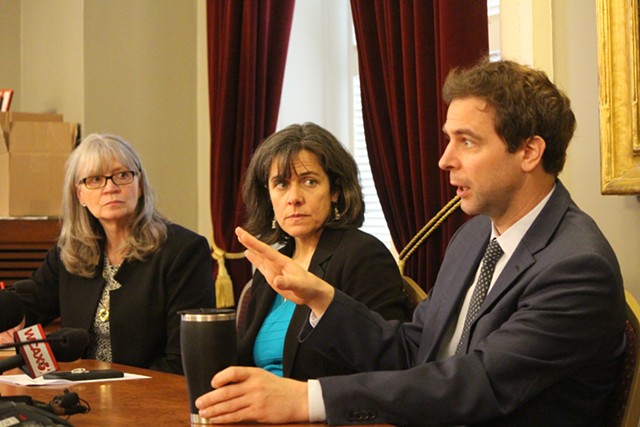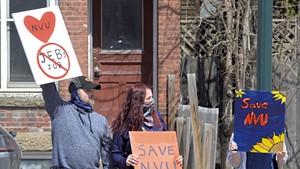
- File: Paul Heintz
- Rep. Patty McCoy, House Speaker Mitzi Johnson and Senate President Pro Tempore Tim Ashe at the Statehouse earlier this year
Vermonters aiming to stay the execution of three Vermont State Colleges System campuses earned a big win Sunday, convincing the board of trustees to delay a vote for at least a week.
Chair J. Churchill Hindes announced Sunday afternoon that the trustees would not vote Monday as previously scheduled on a proposal to shutter campuses in Lyndon, Johnson and Randolph Center in response to a multimillion-dollar shortfall caused by the coronavirus pandemic. The board will instead take up the proposal during an “informational” meeting, Hindes said, and plans to meet again April 27.
“I have listened to my colleagues on the Board and want to give them time to consider the very significant decisions we have to make,” Hindes said in a press release. But he cautioned that delaying further action “increases the profound financial risks facing all four VSCS Colleges and Universities."
“Those risks grow daily,” he said in the release. “We simply do not have the funds to afford a protracted discussion and debate.”
Hindes’ announcement followed a groundswell of opposition to the proposal since news of it broke two days ago. Among critics are some of the state’s top elected officials, who have made clear that they expect to have a say in the decision.
In a joint statement Sunday morning that preceded Hindes', Vermont Senate President Pro Tempore Tim Ashe (D/P-Chittenden) and House Speaker Mitzi Johnson (D-South Hero) urged trustees to temporarily postpone their decision to give the state more time to understand the fiscal impacts and search for possible alternatives.
Related Vermont May Close Three State College Campuses

Vermont May Close Three State College Campuses
By Kevin McCallum
Off Message
"While we recognize that change must come, an abrupt vote to close three campuses, with three days notice, without a public plan for what comes next for the students, faculty and staff, and the host communities is not appropriate, especially in this era of unprecedented unknowns," the lawmakers wrote.
Under the proposal, the college system would close Northern Vermont University's campuses in Lyndon and Johnson and shift programs 100 miles away to Castleton University. It would also close the Vermont Technical College campus in Randolph Center and move operations to that school's Williston campus. About 500 people would lose their jobs. Full details of the restructuring were expected to be presented at Monday's trustees meeting.
At several virtual legislative hearings over the last two weeks, Jeb Spaulding, chancellor of the Vermont State Colleges System, has repeatedly warned of the major deficits facing the schools. This fiscal year alone, the college system projects an operating deficit of up to $10 million, in part due to reimbursements to students sent home when the campuses closed last month. Spaulding said the system could face another potential $12 million shortfall next year due to dips in enrollment.
Noting these challenges, Ashe and Johnson called for a "bridge budget" this year that would keep the campuses operational for at least the next academic year so that decisions about their future could be "more thoughtfully crafted" with the needs of both the state and the college system in mind. They also asked for an economic analysis of how the closures would impact the campuses' three host communities and requested a"multi-institution work group" to explore options beyond closure.
"Geographic and financial access to higher education is critical to creating opportunities for all Vermonters and for our rural communities," Ashe and Johnson wrote.
The Vermont State Colleges System currently serves more than 11,000 degree-seeking students and provides continuing education for over 9,000 adults. But closing the three campuses is as much a political decision as an educational one — particularly for the three rural towns where the colleges remain an important economic engine — and lawmakers from impacted communities have urged the college system to pump the brakes on the proposal.
Vermont’s top two elected officials — Gov. Phil Scott and Lt. Gov. David Zuckerman — issued messages on Sunday, though both fell short of calling for a yearlong delay.
Scott would not initially say on Friday whether he thought the college system should be bailed out, noting that the coronavirus has impacted nearly every Vermont industry imaginable while also blowing a large hole in the state’s budget. He firmed up his stance somewhat on Sunday, declaring that he does not support the closure plan. But he remained lukewarm about funding, questioning the logic of bailing out a system “that is no longer financially viable.”
Scott said a “far better” move would be to “seize this opportunity to save the state college system” and use it to strengthen Vermont’s entire educational system. How exactly he expected that to happen was not immediately clear; Scott tossed that hot potato to lawmakers, asking them to immediately start working on a plan to “rethink, reform and strengthen” the state’s education system.
Related Shuttered by the Virus, Vermont's Colleges Face Enrollment Challenges

Shuttered by the Virus, Vermont's Colleges Face Enrollment Challenges
By Matthew Roy
Off Message
“So many of our community members … were attracted to Vermont by these institutions,” Zuckerman said during a virtual press conference Sunday afternoon. “This will be a tremendous loss for the state looking forward.”
Rebecca Holcombe, who is challenging Zuckerman in a Democratic gubernatorial primary race, also weighed in on Sunday. Urging a delay, the former state education secretary said the proposal could prevent Vermonters, particularly those in the working class, from getting a college education.
“None of us should forget that as much as finances, this is a decision about values,” Holcombe said in a written statement.
Spaulding responded on Sunday to the growing criticism and said that he would happily engage with lawmakers and the governor about the college system's future. But he said a "long deliberation" would only make the problem worse.
“In addition to the inevitable financial consequences, the result would be that students may forgo their education with us, potentially leaving the State, and staff will seek more reliable employment elsewhere,” Spaulding said in the press release announcing the vote's delay.
“It’s that simple,” he continued. “We will find ourselves in a vicious and unending cycle of decline.”
It remains unclear whether the legislature, which has the power to bail the college system out, actually has the ability to prevent it from abandoning a campus. Senate Education Committee chair Phil Baruth (D/P-Chittenden) told his colleagues on Friday that the system believes it has the legal standing to cease educational services at any campus, while the legislature would then decide what to do with the buildings and property.
If the legislature can figure out how to halt the proposal, it may come at a cost: Baruth warned that the state would need to pony up “hundreds of millions of dollars'' if it planned to keep the campuses open long-term. Those who believe otherwise are “kidding” themselves, he said.
The legislature has historically bristled at proposals to invest more in the state college system, despite the fact that Vermont consistently ranks among the lowest states in financial support for public education. So while lawmakers have made it clear that they will not support Spaulding’s stopgap proposal, whether they would support significant, ongoing investments is an open question.
Sen. Jane Kitchel (D-Caledonia), chair of the influential Appropriations Committee, said during Zuckerman’s virtual press conference that lawmakers still hope Vermont can use some of the $1.2 billion it's receiving from the federal government to help sustain the college system in the short term. But she acknowledged that longer-term solutions remain elusive.
Judging from the swift response to Spaulding’s proposal, lawmakers will have no shortage of input from their constituents. A public Facebook group, Protest Vermont State College (Permanent) Closures!, has amassed more than 7,000 members. A change.org petition calling on Gov. Phil Scott and lawmakers to cover the system's deficit and increase its annual funding has hit more than 28,000 signatures. Another petition calling for Spaulding to be removed from his position has exceeded its original goal of 1,500 signatures. And a Northern Vermont University professor has planned a car parade protest through the bare streets of Montpelier on Monday morning.
The hits kept coming Sunday afternoon. Within the span of an hour, alumni councils and faculty unions representing the Northern Vermont University announced they had taken "no confidence" votes in Spaulding. In a scathing rebuke of the chancellor, the NVU faculty assemblies accused Spaulding of rash decision making and scolded him for failing to stand up for the college system and its students. In a separate letter, the group urged the colleges system board of trustees to reject Spaulding's proposal, describing it as a "shortsighted massacre with lasting and irrevocable consequences."
"The Chancellor’s proposal is not a visionary solution: it is a retreat," wrote Tyrone Shaw and Daniel Daley, chairs of the NVU faculty assemblies representing the Johnson and Lyndon campuses.
"Chancellor Spaulding has repeatedly spoken of the need to 'save the corporation,'" the group added. "Apparently, he is intent on doing so at the expense of Vermonters to whom he is obligated to serve."
Disclosure: Tim Ashe is the domestic partner of Seven Days publisher and coeditor Paula Routly. Find our conflict-of-interest policy at sevendaysvt.com/disclosure.
Related Stories
-

Vermont State Colleges Chancellor Sophie Zdatny to Resign
By Anne Wallace Allen September 18, 2023
-

Norwich Dairy Farmers Sue Vermont State Colleges System for $500,000
By Chelsea Edgar May 21, 2021
-

Vermont Colleges Laid Testing Plans to Restart Safely. Will They Work?
by Derek Brouwer August 18, 2020
-

Castleton University President Announces She Will Resign
by Colin Flanders April 30, 2020
-

After Public Crisis, Vermont State Colleges System Charts a Difficult Course
by Colin Flanders April 29, 2020
Speaking of...
-

Next Month Brings the Final Curtain for Palace 9 Cinemas
Oct 27, 2023 -

Garnet Health to Close, Citing Financial Difficulties
Jan 17, 2023 -

Waterworks Food + Drink Closes for Foreseeable Future
Nov 17, 2020 -

Vermont State Colleges Plan In-Person Instruction This Fall
May 4, 2020 -

Castleton University President Announces She Will Resign
Apr 30, 2020 - More »





Comments
Comments are closed.
From 2014-2020, Seven Days allowed readers to comment on all stories posted on our website. While we've appreciated the suggestions and insights, right now Seven Days is prioritizing our core mission — producing high-quality, responsible local journalism — over moderating online debates between readers.
To criticize, correct or praise our reporting, please send us a letter to the editor or send us a tip. We’ll check it out and report the results.
Online comments may return when we have better tech tools for managing them. Thanks for reading.